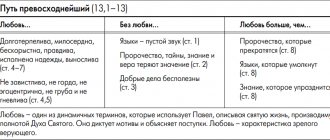Winged expressions from the Apostle Paul
On the day on which the Holy Orthodox Church glorifies the holy supreme apostles Peter and Paul, we bring to the attention of readers twenty-one winged expressions from the “Apostle of the Gentiles” Paul.
- For His invisible things, His eternal power and Godhead, have been visible from the creation of the world through the consideration of creation.
- You are inexcusable, every person who judges [another], for by the same judgment with which you judge another, you condemn yourself, because in judging [another], you do the same.
- There is no partiality with God
- The word about the cross is foolishness for those who are perishing, but for us who are being saved it is the power of God.
- For when the world, through [its] wisdom, did not know God in the wisdom of God, it pleased God through the foolishness of preaching to save those who believe.
- The foolish things of God are wiser than men, and the weak things of God are stronger than men.
- God has chosen the foolish things of the world to shame the wise, and God has chosen the weak things of the world to shame the strong things; God chose the base things of the world and the things that are despised, and the things that are not, to bring to nothing the things that are, so that no flesh should boast before God.
- For as the sufferings of Christ increase in us, our consolation also increases through Christ.
- But even if we or an angel from heaven were to preach to you a gospel different from what we preached to you, let him be anathema.
- A person is not justified by the works of the law, but only by faith in Jesus Christ.
- I have been crucified with Christ, and it is no longer I who live, but Christ who lives in me. And the life I now live in the flesh, I live by faith in the Son of God, who loved me and gave Himself for me.
- He put everything under His feet, and made Him above all, the head of the Church, which is His Body, the fullness of Him who fills all in all.
- For me, life is Christ, and death is gain.
- Take heed, brethren, lest anyone lead you away with philosophy and empty deception, according to human tradition, according to the elements of the world, and not according to Christ; for in Him dwells all the fullness of the Godhead bodily, and you are complete in Him, who is the head of all principality and power.
- I do not want to leave you, brothers, in ignorance about the dead, so that you do not grieve like others who have no hope. For if we believe that Jesus died and rose again, then God will bring with Him those who sleep in Jesus.
- For the mystery of iniquity is already in action, only [will not be accomplished] until the one who now restrains is taken out of the way.
- Therefore, brethren, stand and hold fast to the traditions which you have been taught either by our word or by our epistle.
- And we know that the law is good if someone uses it lawfully.
- It is true and worthy of all acceptance that Christ Jesus came into the world to save sinners, of whom I am the first.
- To the pure all things are pure; but for the defiled and unbelieving there is nothing pure, but their mind and conscience are defiled.
- Above all, put on love, which is the sum of perfection.
If you find an error, please select a piece of text and press Ctrl+Enter.
Share on social networks:
Faith and knowledge
It is in vain, because it is unfounded, that they think about the sciences, even the most accurate ones, that everything in them is based on accurate and reliable knowledge, experimentally demonstrable and perceived by the senses. Not to mention the mass of different theories, assumptions, hypotheses, abundantly scattered in every science, all the so-called “highest and final foundations” of the exact sciences, as well as the “laws” established by them, as the famous, recently deceased philosopher noted in one of his last works Gar (i.e. conjectural, only probable). Here are some well-known examples of this.
Mathematics is considered the most exact science. But mathematical knowledge, as entirely based on the ideas of pure space (geometry) and time (arithmetic), cannot come from experience and observation of the data of experience and can only be based on them; it is purely rational knowledge.
Not a single brilliant mathematician will explain to me the concept of a unit or several units if it is not within me. No person can prove that one and one are two, which Socrates was already amazed at, or that a straight line is the shortest distance between two points. So mathematics begins by forcing us to believe without proof some basic, elementary truths in order to be able to build further conclusions on them. Therefore, if we think carefully, we will not see anything strange and scary in the words of some young people about whom the famous thinker and teacher Pirogov talks in his memoirs; these young people said: “I will accept the mathematical axiom if I want; and if not, then I won’t accept it.”11
Chemistry is based on the belief in a self-contradictory hypothesis about the atom: an atom, as a particle of matter, on the one hand, must have all the properties of matter, and on the other, to explain the origin of chemical compounds of bodies, it is recognized as indivisible. And although no one and nothing can prove that matter consists of individual infinitesimal atoms, science believes this hypothesis about it, because only with the acceptance of this hypothesis can all chemical and physical phenomena be explained and much that is incomprehensible can be unified.
Further, what is matter itself? What is force, what is its relation to matter? Where does the diversity of forces come from? The solution to all these questions lies beyond the scope of empirical knowledge, since experience shows us the detection of this or that force, but does not give us the concept of force as such. You can’t do without faith here either.
No less positive scientists, natural scientists, at least the most cautious and critical of them, begin to see in the so-called “laws of nature” only “the most successful way to present the results of experience in a form convenient for future reference” - something like “convenient shorthand expressions of organized information now at their disposal." Warning against the “mythology of the mechanists,” they remind us that although “in the laboratory, as in practical life, there is no place or time for philosophical doubt,” however, during periods of reflection, when they discuss the theoretical results of their experiments, it is “helpful for them to remember about the limitations of our current reliable knowledge and about the purely speculative (i.e. perceiving on faith - M.Ch.) nature of the scheme of natural science, based only on its own inductions"12. Prof. Poynting, in the face of the Association of Sciences, said: “Physical laws ... until recently they were recognized as the true laws of nature governing the Universe; we can now attribute to them only a modest degree of description of the similarities that were observed, descriptions that are often risky and often erroneous.”
Finally, our very knowledge, according to epistemology, is based to a very large extent on faith. When making this or that conclusion, we make it, believing that our mind did not deceive us, that it worked on the basis of sufficient data, that the process of its work itself complies with the laws of logic and reality, that nothing incorrect entered into its work. And speaking about the correctness of his conclusions, we forget that they are always subjective, why two people judge the same subject differently; hence the constant and incessant disputes between the most apparently solidary people. And what do we know about each subject? It seems to us that we know the object itself as it is; whereas in fact we know, we are conscious only of various sensations, our perceptions, received from the object by us. I say I see a table; when in fact I see something black; touch adds that this black has a certain hardness and density; measurement speaks of its magnitude and so on. And I recognize this sum of sensations as a certain object - a table, relating all these sensations to it and believing that they should be attributed to it. And only our habit of trusting that by doing this we are doing the right thing gives us what we call knowledge of the subject.
Prayers for Knowledge and Discernment for Believers
“And the eyes of your heart have been enlightened, that you may know what is the hope of His calling, and what are the riches of His glorious inheritance for the saints, and how beyond measure the greatness of His power is among us who believe, according to the working of His mighty power” (Ephesians 1:18- 19). Paul prays that believers will understand what God is calling them to do, how in Christ they are rich in “all spiritual blessings” and immeasurably strong in the greatness of His power.
“And I pray that your love may abound more and more in knowledge and in every feeling” (Philippians 1:10). Paul prays that as we come to know God, we will grow in our love for Him and for each other.
“Therefore, from the day we heard about this, we have not ceased to pray for you and ask that you may be filled with the knowledge of His will in all wisdom and spiritual understanding” (Colossians 1:9). Paul prays that believers would recognize God's will for their lives and always have a wise and spiritual outlook.
Prayers for Service Opportunities
“Always asking in my prayers that it may be the will of God that someday it may prosper me to come to you” (Romans 1:10). Paul loved the believers in Rome very much and longed to spend time with them and be close to them.
“For I know that this will work for my salvation through your prayer and the working of the Spirit of Jesus Christ” (Philippians 1:19). Paul knows that the prayers of believers will help him be saved and get out of all difficult situations (When Paul wrote these words, he was in prison).
“Pray also for us, that God will open the door for us to speak, to proclaim the mystery of Christ, for which I am in chains” (Colossians 4:3). Even while sitting in prison, Paul is not thinking about himself, but about others, and how he can bring the Gospel to them.
“Praying earnestly night and day that I may see your face and may complete what is lacking in your faith” (1 Thessalonians 3:10). Paul prays a lot and is filled with great faith, which he wants to share with others.
About the holy and righteous life of believers
“We pray to God that you do no evil, not to appear to us as what you ought to be; but that you may do good, even though we seem not to be what we ought to be” (2 Corinthians 13:7). Paul prayed that believers would stop doing evil and learn to do good.
“That you may walk in a manner worthy of God, pleasing Him in everything, bearing fruit in every good work, and increasing in the knowledge of God” (Colossians 1:10). Paul asks that believers learn to please God in everything, bear fruit, and grow in the knowledge of God.
“For this reason we always pray for you, that our God may make you worthy of the calling, and may accomplish every good purpose of goodness and work of faith with power” (2 Thessalonians 1:11). Paul prays that believers will be worthy to be called Christians and that their lives will be filled with works of goodness and faith in the power of God.
On the faithfulness and perseverance of believers
“Be comforted by hope; be patient in tribulation, constant in prayer” (Romans 12:12). Paul asks that believers take comfort in their hope in God, endure every trial with patience, and remain constant in their prayers.
“Be constant in prayer, watching in it with thanksgiving” (Colossians 4:2). Paul asks that believers be constant in prayer, stay awake, do not wake up during the “quiet times,” and always thank God for everything.
“Epaphras, your servant of Jesus Christ, greets you, always striving for you in prayer, that you may remain perfect and complete in all that pleases God” (Colossians 4:12). We see Epaphras continually praying for God's perfection and will for Christians.
On gratitude and support of believers
“I thank God continually for you, making mention of you in my prayers” (Colossians 1:16). Paul always thanks God for his brothers and sisters and remembers them in his prayers.
“That according to the riches of His glory He may grant you to be strengthened with might by His Spirit in the inner man, and to understand the love of Christ that surpasses knowledge, that you may be filled with all the fullness of God” (Ephesians 3:16,19). Paul prays that Christians will be firmly established and learn to live by the Holy Spirit, that they will deeply understand how much Christ loves them, and that they will be filled with all the fullness of God.
“Grace and peace to you from God our Father and the Lord Jesus Christ. We give thanks to the God and Father of our Lord Jesus Christ, praying always for you” (Colossians 1:3). Paul always desires grace and peace for believers, and he shows that in Christ we have incredible spiritual blessings and perfect peace in our hearts. He prays that we would understand His grace and feel peace and quiet.
“We always thank God for you all, remembering you in our prayers” (1 Thessalonians 1:2). How filled Paul was with love and gratitude for God's children!










